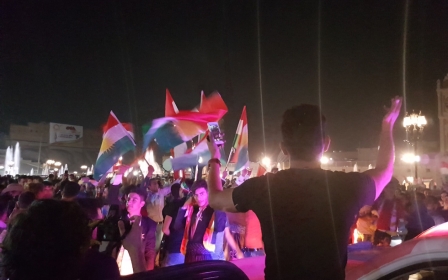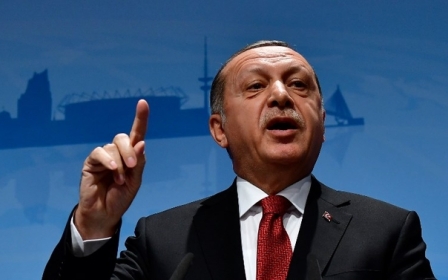In Iran, Erdogan says Turkey will take stronger steps against Iraqi Kurds
Turkey will take stronger steps in retaliation for the Iraqi Kurdish referendum last week, having already taken some measures in coordination with the Iraqi central government and Iran, President Recep Tayyip Erdogan said in Tehran on Wednesday.
At a joint news conference with Iranian President Hassan Rouhani, broadcast live on Turkish television, Erdogan said the referendum had no legitimacy and had only been recognised by Israel.
Fearing Kurdish separatism within their own borders, Iran and Turkey have threatened to join Baghdad in imposing economic sanctions on Iraqi Kurdistan and launched joint military exercises with Iraqi troops at their borders with the region.
'The independence referendum in Iraq's Kurdistan is a sectarian plot by foreign countries and is rejected by Tehran and Ankara'
- Iranian President Hassan Rouhani
Rouhani said the two countries will work together to confront the disintegration of Iraq and Syria to ease tension in the crisis-hit region.
"We want security and stability in the Middle East ... the independence referendum in Iraq's Kurdistan is a sectarian plot by foreign countries and is rejected by Tehran and Ankara," Rouhani told a joint news conference with Erdogan.
Erdogan also said the goal of raising Turkish-Iranian trade volume to $30 billion from $10 billion remained on the agenda and the two countries would conduct trade in their own currencies to limit foreign exchange pressures.
Erdogan will meet with Iran's supreme leader, Ayatollah Ali Khamenei, during his one-day trip to Tehran.
He was preceded in Tehran by Turkish armed forces chief of staff General Hulusi Akar, who arrived on Sunday.
Both countries have held military manoeuvres close to their borders with Iraq's autonomous Kurdish region in recent days to ratchet up the pressure on Kurdish leaders.
Those exercises have also involved forces of the federal government in Baghdad, which has demanded the annulment of the 25 September vote, which returned a 92.7 percent majority for independence.
"Cooperation between Iran, Turkey and Iraq can create stability and security in the region and block moves for secession," Iranian Defence Minister General Amir Hatami said as he held talks with Akar on Tuesday.
Iraq's autonomous Kurdistan region announced on Tuesday it was calling presidential and parliamentary elections for 1 November. Baghdad has responded with further punitive measures, having already slapped sanctions on Kurdish banks, halted all fights and foreign currency transfers to the Kurdish region.
Iraq's central government, its neighbours and Western powers fear the vote in favour of secession could spark another, wider conflict in the region to add to the war in Syria, and fear it could derail the fight against Islamic State.
The Kurds are the region’s fourth largest ethnic group, spread across Iran, Turkey, Syria and Iraq, all of which oppose any moves towards sovereignty.
In Turkey, a 30-year insurgency waged by Kurdistan's Workers' Party (PKK) militants has recently flared up since a ceasefire broke down almost two years ago.
Stay informed with MEE's newsletters
Sign up to get the latest alerts, insights and analysis, starting with Turkey Unpacked
Middle East Eye delivers independent and unrivalled coverage and analysis of the Middle East, North Africa and beyond. To learn more about republishing this content and the associated fees, please fill out this form. More about MEE can be found here.




